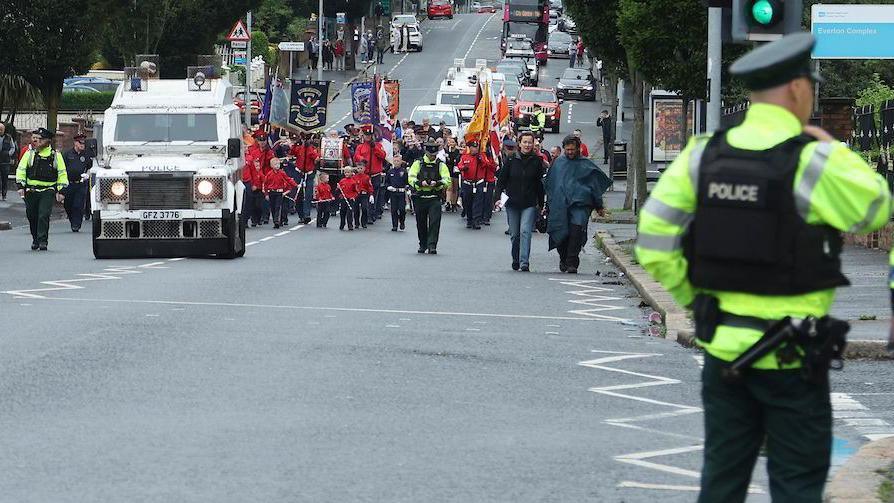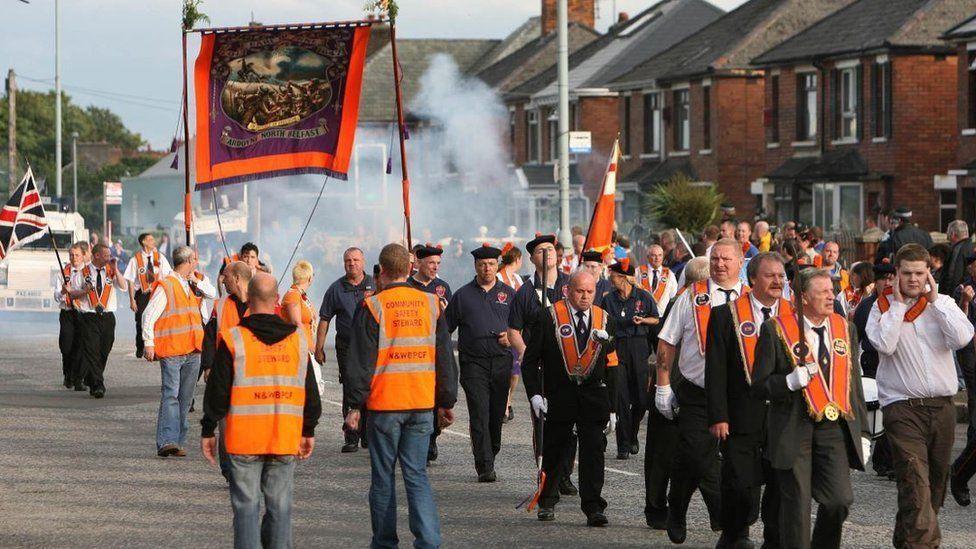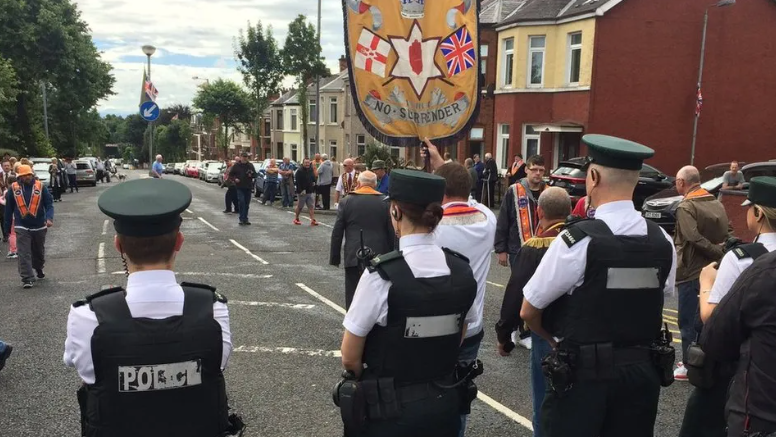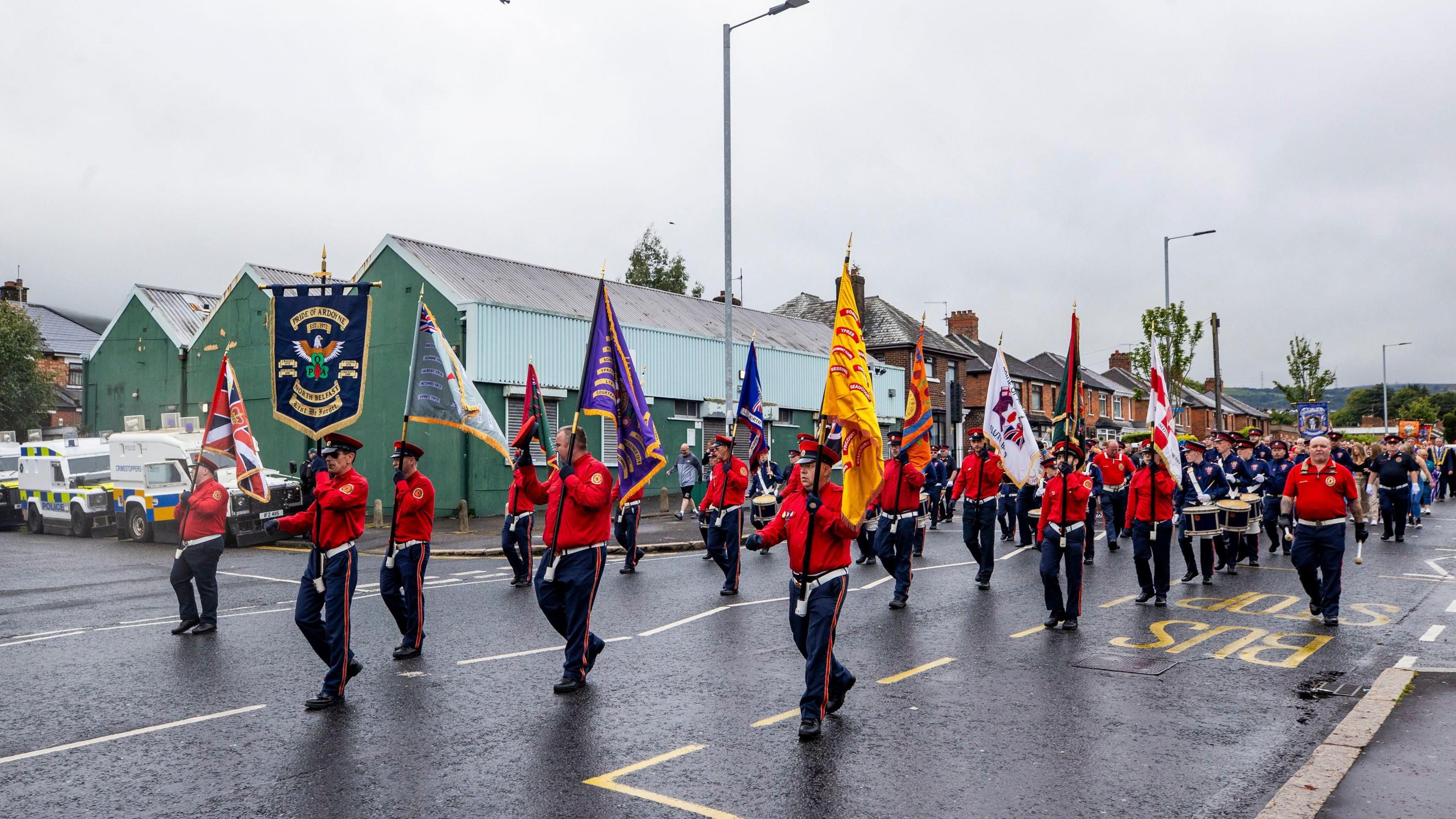What is the Orange Order parade dispute in Ardoyne?

Police at the contentious Ardoyne shops section of Crumlin Road in north Belfast as a parade passes on the Twelfth of July in 2023
- Published
An agreement over one of Northern Ireland’s most contentious parading routes has collapsed.
The north Belfast route, which crosses a section of Crumlin Road that separates unionist and nationalist communities, has sparked violent protests in the past.
An agreement between the Orange Order and the Crumlin Ardoyne Residents Association (Cara) in 2016 brought three years of almost nightly loyalist protests to an end.
Here is how it all started in 2013:
July 2013
Loyalist protests began after a Parades Commission decision not to allow the return leg of an Orange parade to pass a section of Crumlin road in north Belfast.
The commission said Orangemen could walk on this stretch of road in the morning but not in the evening.
The Grand Orange Lodge of Ireland called the decision "ludicrous" and damaging to community relations.
The DUP said many would see the Parades Commission decision as "a reward for violence", but Sinn Féin called it "sensible".
Two residents groups from the adjacent, predominantly nationalist, Ardoyne area called off planned protests against the proposed Orange parade as "a sign of good faith".
Loyalist campaigners vowed to keep protesting until the original parade was allowed to return past the Ardoyne shops section of Crumlin Road.
In the same month, police officers from elsewhere in the UK were brought in to support the PSNI with more than 550 parades, 43 of which were regarded as "sensitive".

July 2014
A legal challenge to the Parades Commission's ruling was dismissed by a High Court judge.
It had been made by a Twaddell Avenue resident.
Loyalist protests against the ruling continued.
7 April 2016
Hundreds of people paraded through north Belfast to mark 1000 nights of loyalist protest at Twaddell Avenue.
Up to that point, policing the nightly demonstrations had cost more than £18m.

Members of the three Orange lodges involved in the Ardoyne parade dispute arrive at police lines in 2016
24 September 2016
An agreement was reached between the Orange Order and the Crumlin Ardoyne Residents Association (Cara).
Cara agreed it would not object to any existing morning parades.
In return, the lodges agreed to a “voluntary moratorium” on applying for evening, return parades.
The agreement stated: "This moratorium would allow for a process between the lodges and Cara to seek agreement on future return parades and if agreement is achieved, the moratorium would be lifted.”
The dispute had cost an estimated £22m to police over three years.
30 September 2016
Protests continued despite the agreement.
More than 200 people took part in a demonstration by another local residents group, the Greater Ardoyne Residents Collective (Garc), which passed off without incident.
A loyalist protest also took place on Twaddell Avenue.

June 2023
The Ballysillan Orange lodge submitted and then withdrew ian application for a flashpoint parade at noon on Saturday 24 June.
The Parades Commission had ruled that it should stop short of the Ardoyne shops, at the junction of Crumlin Road and Wheatfield Gardens, because walking any further would breach the agreement.
The commission said the application was "a wanton disregard for the efforts made to achieve a local agreement and an egregious disregard for the six years of peace it secured".
"It serves only to heighten tensions in a period of political instability and risks serious public disorder," it added.
It also placed similar restrictions on applications for the Orange Order to march through Ardoyne on 12 July 2023.
A residents' group in Ardoyne had told the commission the route requested was "highly provocative".
19 June 2024
The agreement collapsed as the Orange Order, again, applied to march past Ardoyne shops on the evening of the Twelfth of July.
The order claimed Cara had “weaponised” engagement and accused the group of “bad-faith dialogue.”
A nationalist residents’ group says it has planned a protest in response.
The Parades Commission will rule on the matter on 3 July.